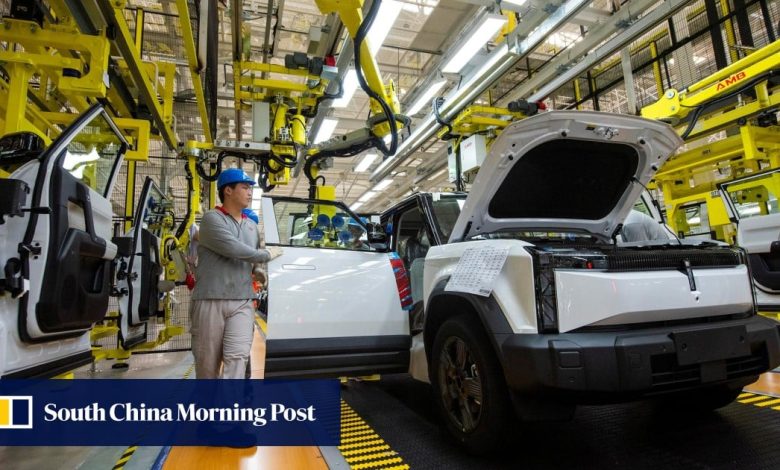Chinese EV makers’ losses mount as rising sales fail to offset steep discounts

“Time is against many companies since they need to survive a cutthroat price war,” said David Zhang, general secretary of the International Intelligent Vehicle Engineering Association. “When they run out of cash amid heavy losses, the carmakers will have to fold their businesses.”
The EV penetration rate in mainland China exceeded 50 per cent for the first time in July, propelled by government incentives and fast-expanding charging infrastructure.
According to the China Passenger Car Association, 878,400 pure electric and plug-in hybrid vehicles were delivered to mainland customers last month, 36.9 per cent more than in the same period in 2023. They accounted for 51.1 per cent of total vehicles sold. China accounts for more than 60 per cent of global EV sales.

Xiaomi handed 27,307 SU7s to mainland buyers last quarter, according to its latest earnings report. It began delivery of the car, which starts at 215,900 yuan, in mid-April.
Losses on the SU7 could be substantial. In April, Citigroup estimated in a research report that the nation’s third-largest smartphone maker could post a net loss of 4.1 billion yuan in its EV unit, based on a projected volume of 60,000 units in 2024. That translates into a loss of 68,000 yuan per car.
Xiaomi said on Wednesday in the earnings report that it targets full-year EV deliveries of 120,000 units.
Revenue shot up 23.8 per cent quarter on quarter to 8.1 billion yuan.
Most mainland EV makers, including Zeekr, have been offering discounts to attract more buyers in the mammoth market.
The companies are willing to incur the price reductions to achieve their volume targets, according to Deutsche Bank.
“They face a dilemma: either losing market share by staying away from price competition, or grappling with the uphill task of improving performance as price cuts eat into their profit margins,” said Chen Jinzhu, CEO of consultancy Shanghai Mingliang Auto Service. “The price war appears to be detrimental to all of the carmakers.”
In February, BYD, the world’s largest EV maker, fired the first salvo in the price war on the mainland, slashing the prices of nearly all its cars by 5 to 20 per cent. After that, the prices of 50 models across a range of brands dropped by 10 per cent on average, Goldman Sachs said in a report in April.
The US bank estimated that the profitability of the entire Chinese EV industry could turn negative this year if BYD were to slice another 7 per cent, or 10,300 yuan off the price of its cars.
Chinese EV makers, believed to be front-runners in terms of production and development capabilities worldwide, also found it difficult to bolster overseas sales.
In May, the White House announced a quadrupling of tariffs on Chinese-made EVs, which now stand at 100 per cent. Last month, additional duties of 17.4 to 37.6 per cent came into effect provisionally in the European Union.
In late July, Beijing announced it would double subsidies granted to EV buyers, just three months after it rolled out incentives to accelerate the transition of the domestic automotive industry.

Consumers who replace a conventional car with an EV stand to receive a subsidy of 20,000 yuan per vehicle, double the 10,000 yuan announced in April.
The expected sales bump from the incentive will not be enough to shore up EV assemblers’ profitability because of the discount war, analysts said.
Underachieving EV companies will be forced to close as competition escalates, Nick Lai, an analyst with JPMorgan, said in June.

